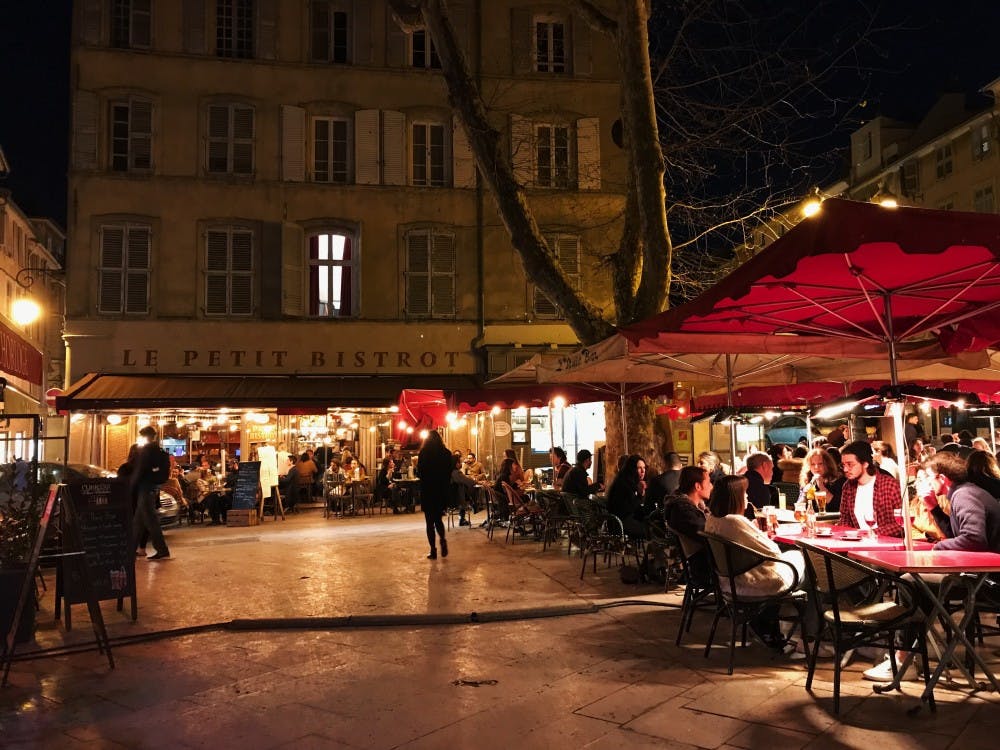During a fi eld trip to Marseille, France for a class, my professor promised us an hour for lunch. He shaved off 10 minutes when he realized we were 10 minutes behind schedule.
Too bad, he said. The meeting time was still 1:30 p.m., as originally planned. He dismissed any ensuing grumbling. Reconvening at 1:30 p.m. was of the utmost importance.
At 1:30 p.m., not even all the students had returned, much less the professor. The minutes ticked by until he strolled up to us at 1:45 p.m., apparently having forgotten to follow the strict directions he’d given us himself. I was both flabbergasted and thoroughly entertained.
I’ve never thought I cared too much about punctuality. But ever since arriving in Aix-en-Provence, France, to study here for the semester, I’ve had to question whether I am, in fact, overly concerned with timeliness.
When I recounted this story to my French host mom, she laughed and told me my professor was clearly running on “le quart d’heure aixois,” or “the Aixois 15 minutes," with "aixois" being an adjective meaning “of Aix-en-Provence”. It’s the idea that you can arrive 15 minutes late to any standing engagement without your tardiness being a big deal. This philosophy, she said, reflects the general attitudes people hold here in the south of France about living a relaxed, stress-free life.
After discovering “le quart d’heure aixois,” I’ve been both its benefactor and the victim with my hearty American “If you’re not early, you’re late” mentality.
For example, one of my professors seems to be incapable of arriving to class less than ten minutes after the official start time. I’ve embraced this habitual tardiness of his, especially because it means I can take a slightly later bus to get toclass. Often, students will roll into class 10 or 15 minutes late, too, and this tardiness isn’t seen as disrespectful as it so often is in the United States. Instead, the professor simply waves the person to a seat and meets his or her apologies with a “C’est pas grave” — “It’s not a big deal”— and a smile.
Once, several friends and I were running late to a class. We were still more than five minutes away when the clock hit the start time of the class. As we rushed through the streets to get there, our professor passed us on his bike, late himself but carefree as ever.
I’ve discovered, though, this region’s flexibility toward time means I can’t ever expect a business to open its doors on the dot. One time, stressed with school and other obligations, I walked to a café and arrived five minutes before its opening time, just so I could stake out the best possible study spot. Big mistake: the proprietor himself didn’t appear at the establishment until 15 minutes after it was supposed to open, rendering my strategy both silly and useless.
It’d be easy to get thoroughly incensed by everyone’s constant lateness here. But I think to do so would be to grow frustrated with the nature of Aix-en-Provence itself, which is something I can’t bring myself to do.
It’s a city made for lingering, for taking your time. Its main thoroughfares are filled with open-air markets three days a week, and in some plazas, vendors peddle their wares seven days a week. By midafternoon, those same spaces have been hosed off by city sanitary workers and replaced with a sea of chairs and tables, where people idle over coffee, beer or wine into the late hours of the night. The next day, this dance starts all over again.
So who can blame someone for dawdling in an alcove, entranced by the soothing rhythm of one of the city’s many fountains, or for taking his or her time at the markets, sampling jams in all flavors from apricot lavender to rhubarb? I, for one, cannot.




